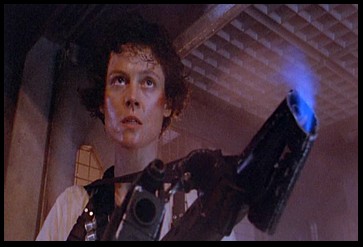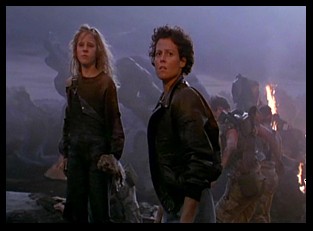

 Audiences may have been somewhat surprised by the fact it was Weaver’s
character who ended up being the hero, and survivor, of the original Alien film.
The actress wasn’t even top billed…that honor went to terrific character
actor Tom Skerritt as Captain Dallas (who was in fact the third of the characters to
die!). "Originally, the Ripley character was devised
as a male role," Weaver explains. "Our
producers had this script about a bunch of guys and they said, 'Hey, wouldn’t
it be interesting if the last person you would expect to save the day was this
young woman?’ They did it, really, for commercial reasons and because they
thought, ’Why not?’ They all loved and respected women. The mistake that
Hollywood makes is that every time they have really strong woman, they usually
have some scene where they tell you why she’s so tough. She was abused.
She lost her parents. They do it instead of just writing a great script played
by a woman with no apologies and no explanations. Eventually, they’ll all
catch on."
Audiences may have been somewhat surprised by the fact it was Weaver’s
character who ended up being the hero, and survivor, of the original Alien film.
The actress wasn’t even top billed…that honor went to terrific character
actor Tom Skerritt as Captain Dallas (who was in fact the third of the characters to
die!). "Originally, the Ripley character was devised
as a male role," Weaver explains. "Our
producers had this script about a bunch of guys and they said, 'Hey, wouldn’t
it be interesting if the last person you would expect to save the day was this
young woman?’ They did it, really, for commercial reasons and because they
thought, ’Why not?’ They all loved and respected women. The mistake that
Hollywood makes is that every time they have really strong woman, they usually
have some scene where they tell you why she’s so tough. She was abused.
She lost her parents. They do it instead of just writing a great script played
by a woman with no apologies and no explanations. Eventually, they’ll all
catch on."
Although there are rumors that the producers of Alien changed the sex of Ripley after becoming aware of Weaver, the actress insists "They made the decision to make the hero a woman long before I got the role."
Her turn as Ripley in Alien was a career springboard that led to such career highlights as the record-breaking Ghostbusters and it’s 1989 sequel, along with her Oscar-nominated performances in Gorillas In The Mist and Working Girl. Seven years after Alien, Weaver’s Ellen Ripley returned to the screen, and this time, there was no question who the star of the show was. Weaver received her first of three Oscar nominations for her forceful performance in Aliens, and pushed her career (and box office drawing ability) further up the ladder. Her work as the gun-totting Ripley earned her a "Rambolina" nickname, and she became one of the few female action heroes.
Although she admits Alien is still her personal favorite, she has fond memories of Aliens, and Cameron himself. "I love Jim," Weaver says. "He's such a fighter. Though he's very demanding to work for, he doesn't demand any less from himself. It's great to have a director who will go the nth degree for his movie. He wrote this remarkable part for Ripley and he had never even met me. I was working on two other films in France and they sent me the script, which was all Ripley and a great part. They hadn't even mentioned it to me. I met Jim, and he was this guy who had gone to the producers, who wanted him to do something else, and he said he wanted to write and direct Aliens. He had only done Piranha 2; they hadn't even seen Terminator yet. So, it was just an incredibly fortunate thing."
 Ripley’s relationship with young Newt is the emotional backbone for Aliens,
and the actress had a good rapport with Carrie Henn. "Working
with Carrie Henn was most enjoyable. I tried to treat her as a fellow actor.
She’s nine, and nine is a whole person. My husband was a child actor, an
Equity member by the time he was eight. He enjoyed that, because he was treated
like a little adult, and when people treated him like a child he considered it
was them who had a problem. But when the other actors treated him like a regular
of the company, he thrived. So I tried to treat Carrie as a fellow actor, just
the way I would treat anyone. Oddly, this is the film where I’ve been
surrounded by a large number of people who actually have less acting experience
than I do. This is my eighth film and I am used to all this stuff. But a lot of
the actors are still making their way. And that’s a nice feeling -- I’m glad
I am not the inexperienced person on the set."
Ripley’s relationship with young Newt is the emotional backbone for Aliens,
and the actress had a good rapport with Carrie Henn. "Working
with Carrie Henn was most enjoyable. I tried to treat her as a fellow actor.
She’s nine, and nine is a whole person. My husband was a child actor, an
Equity member by the time he was eight. He enjoyed that, because he was treated
like a little adult, and when people treated him like a child he considered it
was them who had a problem. But when the other actors treated him like a regular
of the company, he thrived. So I tried to treat Carrie as a fellow actor, just
the way I would treat anyone. Oddly, this is the film where I’ve been
surrounded by a large number of people who actually have less acting experience
than I do. This is my eighth film and I am used to all this stuff. But a lot of
the actors are still making their way. And that’s a nice feeling -- I’m glad
I am not the inexperienced person on the set."
Including the bond with Newt, Ripley undergoes some major emotional
changes in Aliens, which was the challenge for Weaver as an actress. "To
me, it is a story of a woman who loses her whole life, and has to start over
again. I don’t think she’ll ever be the same again. I mean, she’ll never
be that eager young ensign, but who’d want to be anyway. You’ve got to be
anyway. You’ve got to move on.
"I don’t really feel I’m recreating her. In a sense, it’s nice to
have the first film as a rehearsal for this experience. That was my first film,
and this is several films down the line, so, to me, this is like playing a whole
new role. In a sense, both Ripley and I have changed as time has gone on. If Jim
had wanted me to recreate that young inexperienced ensign, then I think there
would have been a problem. I certainly didn’t want to do a sequel unless we
all felt that there was something else that needed to be said about it."
The Alien series has had it’s ups and downs, with the first two being great critical and commercial series, the third poorly received on all fronts, and the fourth gaining decidedly average marks. Weaver has been the only performer to appear in each of the instalments, and the possibility of her returning one more time exists; unlike Alien 3, Alien Resurrection had an ending which you could imagine leading to another sequel. In Resurrection, the Ripley clone had taken on a darker frame of mind than her human alter ego, and this alone could open new doors. "It’s my feeling that she aligns herself with the humans because they have the ship, but I don’t think she has actually chosen sides. It’s not possible for her to choose sides at this point. She feels a great kind of relief when she’s with the Aliens and a real cynicism when she’s with the humans. I think the humans, as always in the Alien movies, are such creepy people. So, there’s still more to explore and maybe we’ll explore it."